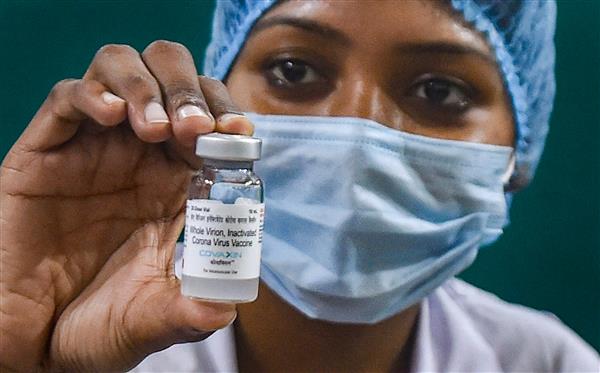
The prices for COVID-19 vaccines internationally have varied between $10 to $37 a dose, (Rs 730 - Rs 2,700 a dose). PTI file photo
Aditi Tandon
Tribune News Service
New Delhi, June 15
Bharat Biotech on Tuesday defended higher private cost of Covaxin saying the differential between government and private pricing is needed to offset massive costs the company is undertaking to produce the jab based on the inactivated virus technology which required massive investment in safety and infrastructure.
Arguing for freedom to have dual pricing policy — Rs 150 a dose for the Centre and a higher cost for the private sector Bharat Biotech said low product price realisation dispirits domestic R&D.
“Companies such as Bharat Biotech, which are innovators with specialised expertise in product development, and large scale manufacturing, should be allowed to maintain a differential pricing strategy for Governments and private hospitals. It is distressing to see that a large country like India has a very basic level of innovation in vaccines and pharmaceutical products. It may well be argued that the low-price realisation for home-grown innovators constraints innovation and product development in India. In the absence of a dual pricing system, Indian vaccine and pharmaceutical companies risk being reduced to mere contract manufacturers with intellectual property licensed from other nations,” a company statement said amid a debate on Covaxin being the costliest vaccine in the Indian market with price capped at Rs 1,410 a dose as against Rs 780 and Rs 1,145 a dose for Covishield and Sputnik V.
Explaining why Covaxin was more expensive for the private sector and free for the government, Bharat Biotech said, “This is purely due to fundamental business reasons, ranging from low procurement volumes, high distribution costs and retail margins among few others as explained above. As directed by the Government less than 10 pc of our total production of Covaxin to date has been supplied to private hospitals, while most of the remaining quantity was supplied to State and Central Governments. In such a scenario the weighted average price of Covaxin for all supplies realised by Bharat Biotech is less than Rs 250 a dose. Going forward, 75 pc of the capacity will be supplied to State and Central Governments with only 25 pc going to private hospitals,” said the firm.
The supply price of Covaxin to the government of India at Rs 150 a dose, a non-competitive price and clearly not sustainable in the long run, the company states adding that a higher price in private markets is required to offset part of the costs.
Higher private pricing of vaccines has been happening in the past.
Human Papilloma virus vaccine is priced for GAVI supplies at $ 4.5 a dose (Rs 320), but is also available in the private market at Rs 3500 a dose. Rotavirus vaccines are supplied to the Govt of India at Rs 60 a dose, but is also available in the private market at Rs 1,700 a dose.
The prices for COVID-19 vaccines internationally have varied between $10 to $37 a dose, (Rs 730 - Rs 2,700 a dose).
Biotech said private procurement is discretionary. “The procurement of vaccines by private hospitals is optional and not mandatory, though it gives a choice to citizens who are willing to pay for better convenience,” said the company.
It said Bharat Biotech has so far invested over Rs 500 crore at risk from its own resources for product development, clinical trials and setting up of manufacturing facilities for Covaxin and the support from the Indian Council of Medical Research (ICMR) was with respect to provision of the SARS CoV2 virus, animal studies, virus characterisation, test kits and partial funding for clinical trial sites.
“In return for this valuable support, Bharat Biotech will pay royalties to ICMR and the National Institute of Virology (NIV), based on product sales. Royalties are also payable to Virovax towards the licensure of IMDG agonist molecules.
We are investing in new facilities and repurposing existing ones across several states for enhancing the production of Covaxin. The urgent need to set up a significant number of manufacturing facilities and to divert existing ones for Covaxin, has resulted in reduced production of other vaccines at our facilities, leading to loss in revenues. We have been extremely diligent in selecting manufacturing facilities and partners, with the required levels of containment, capabilities and expertise. Product development activities towards the development of vaccines against newer variants is also underway at our facilities,” the firm said adding that the whole-virion Inactivated Vero Cell vaccines (Covaxin derives from this technology platform) are highly complex to manufacture since the critical ingredient is based on live viruses which require highly sophisticated, multiple level containment and purification methods and involve investments.
“Such high standards of purification automatically lead to significant process losses and low yields save the outcome of a highly purified and safe vaccine.
The sheer complexity of the Covaxin manufacturing process is manifested by the fact that it requires about 10,000 sq metres of area to manufacture around 200 million doses of the vaccine annually. In comparison, the same quantity of live virus vaccines can be manufactured from mere 1,500 sq metres. Due to the highly contagious nature of the live SARS-CoV-2 virus, more stringent Biosafety Level-3 (BSL-3) containment facilities are required for the manufacturing of Covaxin. Every batch of manufactured product is subjected to more than 200 quality control tests, prior to its release,” said the company.
The statement added that it is exactly this complexity that has kept away other companies from developing vaccines, especially whole virion inactivated vaccines.
The SARS CoV2 virus provided by ICMR-NIV is also equally available to other manufacturers who wish to develop and manufacture such a vaccine, Bharat Biotech said adding that companies would need access to cell lines, BSL3 manufacturing quality control facilities, and several well trained technical teams, to manufacture Covaxin.
Join Whatsapp Channel of The Tribune for latest updates.



























